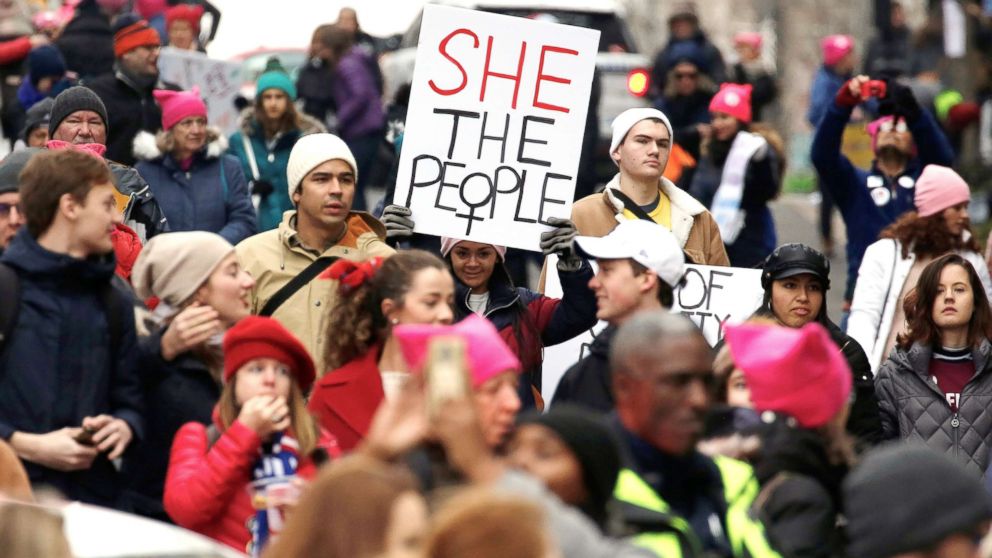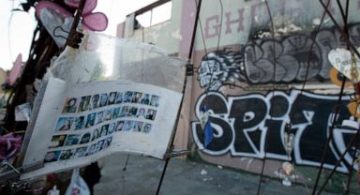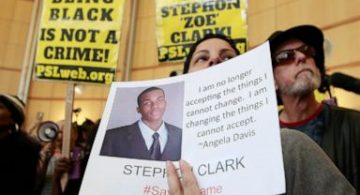
For the third year in a row, women across the world came out in the thousands to protest the Trump administration and to fight for women’s rights.
But the Women’s March on Saturday is poised to look different from the the first one in 2017.
Back then, it was organized in response to the incoming presidency of Donald Trump and yielded a global movement. On the day after his inauguration, crowds marched across the U.S. in the largest single-day protest in U.S. history.
But this year, the event was mired in controversy over the Women’s March Inc.’s leadership amid accusations of anti-Semitism and racism.
Echoing 2017, this year’s formal main march is being held in Washington, D.C., with more than 100 other marches planned for cities around the world.
In Europe, the protests kicked off early Saturday. Hundreds of Londoners took part in a “Women Demand Bread & Roses” protest, rallying in Trafalgar Square. In Berlin, women marched holding signs that said, “My body, my rules.”
In D.C., protestors came from around the U.S. to gather at the National Mall.
A 5-year-old girl named Isabella came with her family from Chicago to send a message to Trump. She told ABC News that “Donald Trump needs to be kinder.”
Her father is a Mexican-American emergency doctor who came to the U.S. when he was 8 years old. He says today’s important message is that “everyone here is united for good.”
But much of the buildup before the rally focused on the controversy and how organizers were seemingly at odds.
For months, women who had previously participated in the marches exchanged text messages and Facebook posts about whether one of the founders of the movement was anti-Semitic. In the week leading up to the event, the march drew as much attention for controversial comments made by the organizers as the upcoming event itself.
Though the conversation has been ongoing for the past year, the allegations were formalized in an article in the online Jewish magazine Tablet.
On Monday, two of the march’s organizers appeared on “The View,” fueling the controversy. Co-president Tamika Mallory defended her relationship with Louis Farrakhan, the head of the Nation of Islam, who has long fielded charges of anti-Semitism.
“As a leader, as a black leader in a country that is still dealing with some very serious unresolved issues as it relates to the black experience in this country, I go into a lot of difficult spaces,” Mallory said on the show. “Wherever my people are, there that’s where I must also be.”
Still, protesters joined rallies Los Angeles, New York and Iowa, where New York Sen. Kirsten Gillibrand was scheduled to speak.
In D.C., pink “pussy hats” dotted the crowd, and protesters held up signs protesting Trump while others held signs in support of transgender rights, reproductive rights and gun control. Protestors also invoked Supreme Court Justice Ruth Bader Ginsburg and signs that read “believe survivors.”
One marcher shouted, “Get your tiny hands off my underpants!” as she walked by.
Speakers from Black Lives Matter, Hope Butler, Women of Piscataway, Oglala Lakota Nation Couchiching First Nation, Standing Rock Sioux Nation and event organizers Linda Sarsour and Tamika Mallory are scheduled to take the podium.
In addition, union leaders will also speak, in a particularly precarious week for organized workers in the U.S. The National Federation of Federal Employees will be represented, as the partial U.S. government shutdown continues into its 29th day.
Randi Weingarten, head of the American Federation of Teachers, will also speak, as the teachers’ strike in Los Angeles, the country’s second-largest public school system, threatens to stretch into its second week.
In Texas, women took to the streets in temperatures that dipped into the 30s. Sandra Parker, a 59-year old retired air traffic controller, headed to Denton for her third Women’s March. As a child of government workers with many family members still in public service, the stalemate in Washington is cause enough for protest.
“Our country is a joke. Women are not taken seriously and called hysterical or ‘bitch’ if they are as forceful as a man. Strong women are not silent. I march for myself, my daughter and my granddaughters!” Parker said. “Sick sick sick of this shutdown and our supposed leaders! I care!”
ABC News’ Matthew Seyler and Lana Zak contributed to this report.





